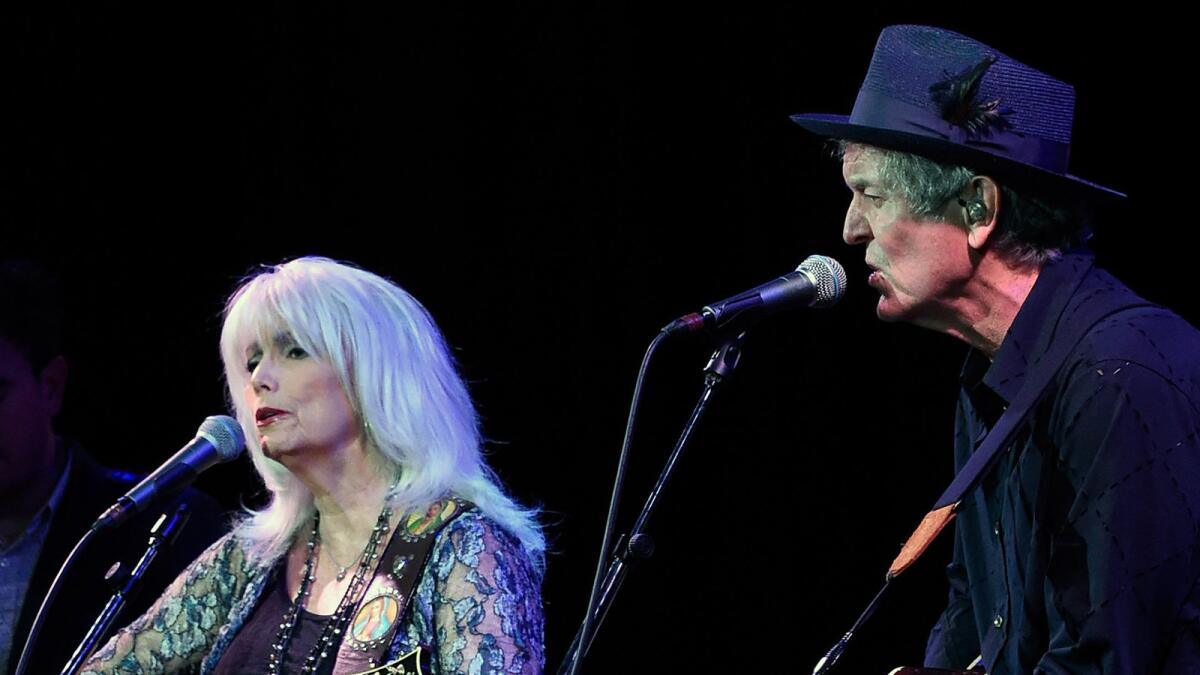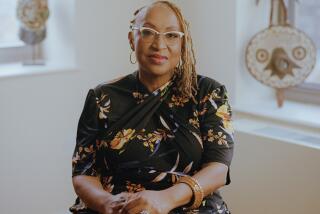Emmylou Harris, Rodney Crowell on a graceful ride in ‘The Traveling Kind’

Emmylou Harris and Rodney Crowell perform at City Winery Nashville on May 27, 2015, in Nashville, Tenn.
- Share via
Emmylou Harris and Rodney Crowell, “The Traveling Kind” (Nonesuch). Few can harmonize with as much grace as Harris, whose formative work with Gram Parsons starting in the early ‘70s continues to influence new generations of country artists. And few can lyricize with as much grace as Crowell, whose songs over roughly the same period continue to resonate. On their second album of duets after decades of friendship, that familiarity breeds a level of hard-won honesty.
“We don’t all die young to save our spark / From the ravages of time,” they sing in unison to open. “But the first and last to leave their mark / Become the traveling kind.” Far from ravaged, Crowell and Harris move with patience through the midtempo meditation on timeless art. As Crowell strums chords, mandolin and gut-stringed guitar offer accents. Produced with typically admirable restraint by Joe Henry, “The Traveling Kind” features songs mostly written or co-written by the pair — their desperate take on Lucinda Williams’ “I Just Wanted to See You So Bad” being an excellent exception.
“Sweet Lucinda” may or may not be about Williams, who lives in Los Angeles, but it’s definitely an indictment of Los Angeles living. “Sweet Lucinda, look out your window,” implores Crowell, “L.A. freeway just like the man said / People honkin’ their horns / Pointin’ guns at your head.” The two show unity in the chorus, even if its reasoning is misguided: “Bring it on home to Memphis.”
Little Richard, “Directly From My Heart: The Best of the Specialty & Vee-Jay Years” (Concord Music Group). The original rock ‘n’ roll gender-bender, Little Richard is such an integral part of the American pop landscape that it’s easy to take for granted his cultural import. During his peak fame in the 1950s while his first-generation peers Elvis Presley, Chuck Berry and Jerry Lee Lewis served as daughter-threatening fodder, Little Richard exuded a revolutionary “flamboyance” that upended expectations during the sexually repressed ‘50s. Despite cries of outrage from conservatives, much of America ultimately celebrated Little Richard’s freedom and accepted the proverbial elephant in the room. (It didn’t hurt that the Beatles cited his influence from the start.)
The artist was a virtual also-ran when he hooked up with Los Angeles’ Specialty Records and its A&R man, Bumps Blackwell, in the mid-1950s. But after one revelatory day in a New Orleans studio, the artist hit upon the chaotic, beat-heavy style that would come to define him. The hits are all within this three-CD set, but the lesser-known misses and B-sides like “Cherry Red” are the real revelation. This stuff remains alive, strange and visionary, driven by the hard proto-funk drumming of the unsung influencer Charles Connor and Lee Allen’s ridiculously memorable tenor saxophone solos. Want to hear a masterful performance? Note the drum work on “Cross Over.” Vintage? Definitely, but as evidenced throughout “Directly From My Heart,” crucial.
More to Read
The biggest entertainment stories
Get our big stories about Hollywood, film, television, music, arts, culture and more right in your inbox as soon as they publish.
You may occasionally receive promotional content from the Los Angeles Times.











